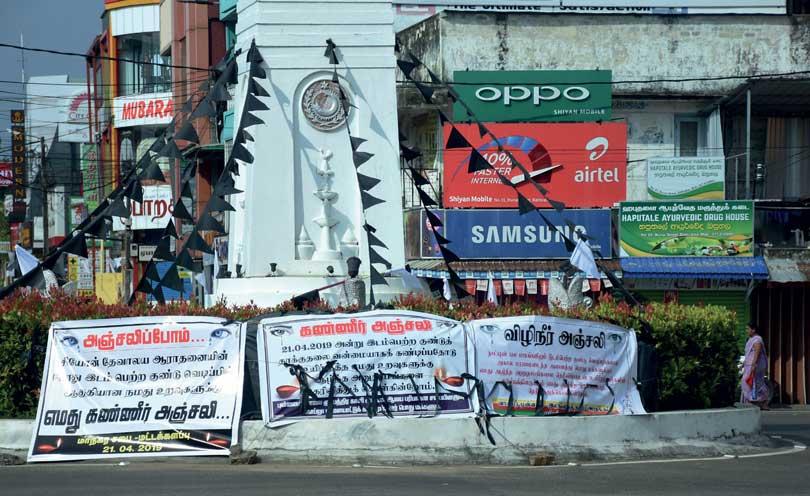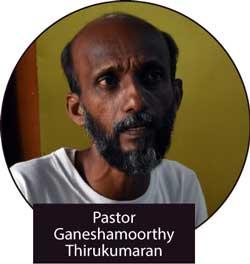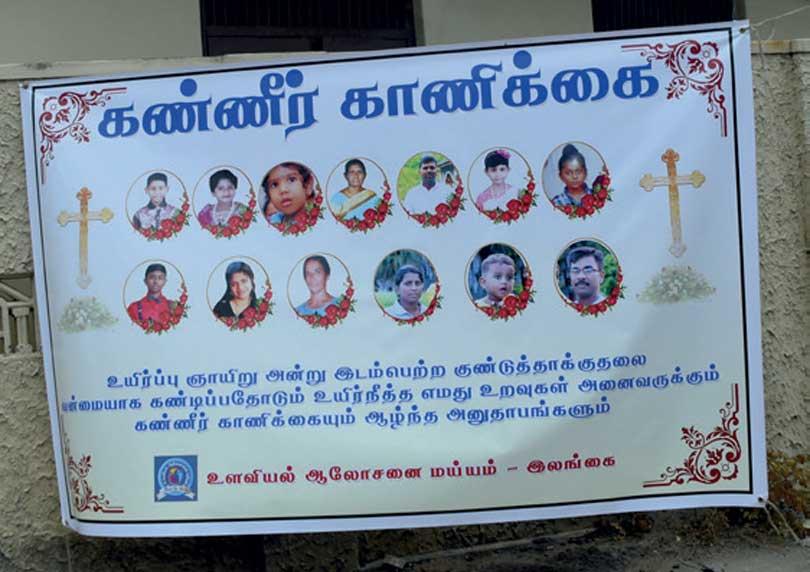Reply To:
Name - Reply Comment

The attacks sparked a mass outpouring of grief in the Batticaloa town
Pics by Kushan Pathiraja
 The trauma and heartache of the Batticaloa Zion Church attack was compounded by the fact that most of the victims were either children or youth. The bomb had initially claimed 26 lives, including 14 children. But this figure rose to 31 within months, as six more serious cases, including one child, succumbed to their injuries. This is despite concerted efforts by medical teams in the Batticaloa, Kandy and Anuradhapura hospitals who pooled their resources and worked tirelessly to treat the casualties.
The trauma and heartache of the Batticaloa Zion Church attack was compounded by the fact that most of the victims were either children or youth. The bomb had initially claimed 26 lives, including 14 children. But this figure rose to 31 within months, as six more serious cases, including one child, succumbed to their injuries. This is despite concerted efforts by medical teams in the Batticaloa, Kandy and Anuradhapura hospitals who pooled their resources and worked tirelessly to treat the casualties.
Many lost more than one family member
Among the 15 children who died were nine boys and six girls, the church’s Assistant Pastor Ganeshamoorthy Thirukumaran said. The youngest was one-and-a-half-year-old Jabez Jasanthan. Another was two-and-half-year-old Amshika Surendrakumar. The other children were in primary or secondary school. Of the 16 adult fatalities, three were in their youth, pastor Thirukumaran revealed.
And so, one year on, the community continues to struggle to come to terms with the horror of April 21, 2019. The victims came from 23 families, meaning many lost more than one family member. Baby Jabez’s parents, Jasanthan and Sujikala, also died. For each death, the government granted the next-of-kin Rs.1 million as compensation. But no one in the Jasanthan family received this, because no one survived.
 Among the survivors, some have lasting injuries. Little Elisha Deborah (7) lost her eyesight. She also lost her parents and her cousin Jet Jackson (13). Her mother was the church librarian. Deborah, or Debbie as she is fondly called, now lives with her aunt and uncle. There is some hope, as a team of Canadian eye specialists have agreed to examine the possibility of an eye transplant for Debbie. But travel to Canada has been put on hold due to the COVID-19 pandemic.
Among the survivors, some have lasting injuries. Little Elisha Deborah (7) lost her eyesight. She also lost her parents and her cousin Jet Jackson (13). Her mother was the church librarian. Deborah, or Debbie as she is fondly called, now lives with her aunt and uncle. There is some hope, as a team of Canadian eye specialists have agreed to examine the possibility of an eye transplant for Debbie. But travel to Canada has been put on hold due to the COVID-19 pandemic.
On that fateful day, more than 100 people were injured. Many are now in the final stages of recovery, and are hoping for full physical recovery soon. But there are others who are less fortunate. For example, Chelian Anulekha, in her mid-40s, managed to save up and travel to India to receive much-needed physiotherapy treatment. She is still overseas, and her husband is by her side. But Anulekha is still unable to walk or talk properly. Another survivor, Rebecca Arasaratnam, was badly burnt and needs regular medical supervision from Colombo. But the COVID-19 curfews have prevented her from travelling to the Western Province for essential medicines and treatment.
Those affected also feel that the COVID-19 situation has made the rest of the country forget their plight. They fear that if people forget, similar incidents could recur in the future. There is cautious optimism though, that ongoing investigations into the attack would yield positive results.
Message of forgiveness
Pastor Thirukumaran himself lost his second son, Shalom Malkiah (14), in the attack. “The past year has been very difficult for us. My wife and I and the children are mourning the loss of our dear Shalom Malkiah,” the grieving pastor said. “We spend a lot of time in family prayer. We have lots of questions in our hearts, and no answers,” he exclaimed. “But we forgive the people who hurt us. We seek no revenge against them. We are praying for them.”
Pastor Thirukumaran spoke of Malkiah’s talents and qualities. “He was talented, not just in studies, but in art and music too. He played the trumpet and Octopad. And I remember him as a five-year-old playing the role of the Archangel Michael in a Sunday school play,” Pastor Kumaran reminisced. “He was naturally helpful, and helped his mother a lot at home.” Even his teachers at Methodist Central College would ask Malkiah to help them tutor junior students.
Unsung heroes
Sasikumar Chandrika (37) from Kallady lost her husband Sasikumar (41) and son Merujan (14). Her husband was an unsung hero in the tragedy. Sasikumar, and another worshiper Ramesh Raju (40), lost their lives as they prevented the bomber from entering the church building. Had the bomber entered the church, more people would have died, as almost 500 worshippers were inside waiting for the Easter service to begin.
Sasikumar and Ramesh had noticed a stranger in his 30s with a backpack lurking near the church. His behaviour had made them suspicious, and they questioned him. When confronted, the stranger had moved away briefly. But again he had made his way towards the church, and tried to enter the building. “Sasikumar asked him why he returned, and told him he could not enter the church,” Chandrika said. An argument had ensued between the men. “My son Merujan was nearby. He told my husband not to argue with the man. The bomber then detonated himself, killing my husband, son and so many others. The time was about 9.02 or 9.03 a.m.,” said Chandrika, who was inside the church with her daughter. The explosion shattered the building, engulfing it in flames. Survivors had to break through the church roof to escape the inferno.
“Sasikumar was not a proud man. He was always careful with money and never spent on anything without consulting me. He loved the children very much,” Chandrika said. Two months before the bombings, the couple had begun an eatery, selling rolls, parata, pittu and so on. Sasikumar had just recently returned from employment in Saudi Arabia.
Speaking of her son, Chandrika said Merujan was clever at Maths and was a prefect in his school, Kallady Sri Shakthi Vidyalayam. “Merujan was a good boy. He didn’t loaf around, and stayed indoors with me and his sister,” she said. Sibling loss is rarely acknowledged. But Merujan’s eight-year-old sister Rekshika misses her brother intensely. They went to the same school. After losing her brother, Rekshika refused to go to school because seeing the other boys reminded her of Merujan. After staying at home for several months, she moved to St Theresa’s Girls school. Only in January 2020 did she start going back to church.

A banner paying tribute to the victims of the terror attack
Aid cannot erase the pain
Since the attacks, various groups have contributed funds to support affected families. For example, Chandrika receives Rs 25,000 per month for her domestic expenses. She lives on rent, with her mother and daughter. Rekshika too receives money, which can be withdrawn when she turns 18. But as with many others, the attack affected Chandrika’s livelihood. She stopped the eatery as she could not cope with the workload and shop rent. She now makes food parcels for local construction workers. Economic hardship has added to Chandrika’s and many others’ trauma and grief.
Counsellors had initially visited people’s homes to help them cope with their emotional pain. But later, people were asked to attend counselling sessions in the Batticaloa Hospital. There are questions about the effectiveness of this approach, with reports that many victims, especially children, preferred to stay at home and avoid these sessions.
Although money and materiel benefits can never erase their pain, the church community is grateful to the groups and individuals who stepped in to help them. For example, Caritas and Sarvodaya intervened with scholarships and aid for students. Many other NGOs and private companies gave material and financial assistance, and the government compensated families who lost loved ones and had to care for the sick and wounded. “We want to thank everyone who helped us. We got help from all over the country and the world. Their support has helped us in our grief,” Pastor Thirukumaran said. “Many cried with us, and shared in our sorrow. Many we don’t even know personally.”
Stalled construction
While the bigger churches that were attacked have been rebuilt, work on the Zion Church has been stalled. Authorities promised to build three blocks, including the main church building, the library and meeting hall and pastor’s residence. But construction stalled in January this year, and the church building remains incomplete and unfit for use. “We have to worship in rented spaces such as the Methodist Church hall and St John’s hall of the Church of South India. We have no proper place to worship. Are we being neglected,” Pastor Thirukumaran asked. The congregation had planned to gather on April 21 and pray together to remember the victims and survivors of the attack. But because of social distancing measures they are unable to do this. “We have to adhere to public health regulations, but nonetheless we are somewhat sad that we cannot gather together to pray for everyone,” the pastor said.
Truth must prevail
With the emergence of Tamil militancy in the 1980s, the Eastern Province saw a spike in hostilities between Tamil and Muslim communities, who until then had lived peacefully side by side. After the end of the war in 2009, tensions continued, and in many instances were politically manipulated. But throughout the war years, and after, inter-religious and community-based groups have been working at grassroots level to build goodwill and trust among the communities. But these efforts faced a severe setback with the Easter bombings. This was echoed by Batticaloa Bishop Rt. Rev. Joseph Ponniah who said, “We are trying to build a good relationship with all religions. But incidents like the Easter attacks harm such relationships.”
Since the attacks, inter-religious groups have been meeting regularly to rebuild ties between the Tamil and Muslim communities. Soon after the attacks, Muslim businessmen who run most of the textile, hardware and food outlets in Batticaloa town stayed away, fearing reprisals. Also, Muslims symbolically hoisted white flags of mourning and peace, while Tamils hoisted black flags of grief and protest. But residents said the situation has improved, and things were slowly returning to normal.
Commenting further on the situation, Bishop Ponniah said: “We were really shocked by the Easter bomb attacks, especially because it was a planned attack against Christians. It will take time to come out of this, even though people have been receiving support. The culprits of the crime should be punished, and truth must prevail. Sri Lanka is one nation and one family. We should act as brothers and sisters. There should not be any hatred among us based on religion, ethnicity or language. Reconciliation means we have to accept and forgive each other. Terrorism of this nature should be prevented from happening in the future.”